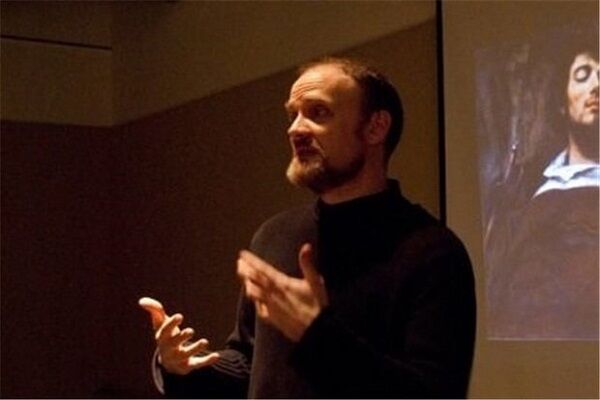
Tehran Book Fair shows diversity of Iran’s culture
1402/02/17-23:51
Professor Kevin Richards says the Tehran Book Fair provides an opportunity to showcase the diverse range of expression within the contemporary culture of Iran, even as such an event requires visibility in the media.
Dr. Kevin Richards is Associate Professor, the Chair of Liberal Arts, and the Low-Residency MFA Program Head. He teaches in the Certificate/BFA and the MFA programs. He holds a Ph.D. (1995) and MA (1992) from Bryn Mawr College and a BA with honors from the University of California-Berkeley (1989).
His areas of expertise include 19th-century art and aesthetics, contemporary art, French theory, film history and theory, and, in particular, the work of the philosopher Jacques Derrida. In addition to his scholarly pursuits, he works as an artist and a curator, regularly exhibiting his photographs, videos, installations, and sound art.
He has published numerous essays in the field of 19th-century art history, contemporary art, aesthetics, and literature, including "Eve’s Dropping/Eavesdropping" in Refracting Vision: Essays on the Writings of Michael Fried (Power Publications; Sydney, 2000). He has also published a book, Derrida Reframed: A Guide for the Visual Arts Student (IB Tauris; London, 2008) and served as guest editor for the American Book Review.
Richards teaches Art History in the Certificate/BFA program. He is a Critic and teaches seminars in Readings and Research, and Aesthetics and Criticism in the MFA program.
Following is the full text of the interview:
Q: Are you familiar with Tehran Book Fair? If your answer is yes, how did you get to know it? If you are not familiar with it, how can Tehran Book Fair be included in the cultural calendar of the world?
I became familiar with the Tehran Book Fair thanks to a few of my students from Iran who mentioned its significance culturally. I think it is important that such events are better recognized worldwide, even as we see a huge expansion of cultural events due to globalization. It also raises larger questions around the visibility of culture globally, something that is often impacted by questions around the media and a world all-too-often driven by distracting forms of entertainment.
Q: In general, what is the position of the book as a cultural commodity in cultural diplomacy?
A: Books and scholarship have an important role in cultural diplomacy. It is a space where leading minds in different fields can find an arena to present new ideas and reinvigorate the relevance of cultural legacies to the contemporary world. It allows for a recognition of the role of culture as something that marks each area uniquely, even while allowing a window into the different cultural values marking the world today. The book represents both a tradition and a challenge to tradition, even as the status of the book is challenged by digital media and new forms of creative expression.
Q: Every year, cultural events in Iran begin with the Tehran Book Fair, and many people participate in it, and the entire cultural and artistic currents in Iran are somehow related to this exhibition. To what extent can such an exhibition represent the contemporary culture of Iran by reflecting in the media?
A: In bringing together a range of cultural and artistic forms of expression, the Tehran Book Fair provides an opportunity to showcase the diverse range of expression within the contemporary culture of Iran, even as such an event requires visibility in the media. It presents an opportunity to provide a more complete picture of the intellectual pursuits in Iran, as well as offering a way of juxtaposing these achievements in relation to other cultural products.
Q: If we assume that you are planning to visit the Tehran Book Fair this year, what is the first reason for this visit? Do the mere name of Iran and its civilizational and cultural background attract you to attend the exhibition, or is it the temptation to familiarize yourself with the books produced in Iran's publishing industry?
A: It would be a great event to attend, both for the highlighting of art and culture within Iran, as well as the opportunity to encounter the work of specialists within Iran’s publishing world. In this way, it not only provides the opportunity to learn more about the experiences and values of Iranians, but also to become familiar with experts leading the charge in the area of Iranian culture and art. For myself, the opportunity to expand knowledge is always a valuable experience, even as the chance to delve deeper into Iran’s publishing industry offers a great deal of interest too.
Q: If you want to prepare a book about the contemporary situation of Iran in the fields of culture, politics, and religion, in which countries would you rely more on the published research and prepare it?
A: In any scholarly endeavor, the investigation of a range of work in the relevant field is necessary. In terms of the contemporary situation of Iran, this would certainly entail looking to work in the fields of culture, politics, and religion being produced within Iran, while also turning to experts in research institutions focused on aspects of contemporary Iran. These would include some of the leading institutes in universities within the United States, Europe, and the Middle East, in an effort to be able to survey and assess the larger field of intellectual inquiry concerning contemporary Iran. In this regard, the Tehran Book Fair is an important opportunity to discover recent scholarship. It provides one facet to a fuller understanding and appreciation of the intellectual and cultural endeavors of Iranians today.



 بازگشت
بازگشت

